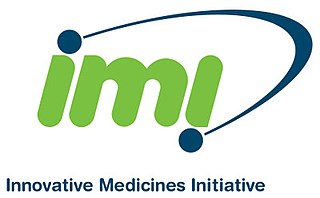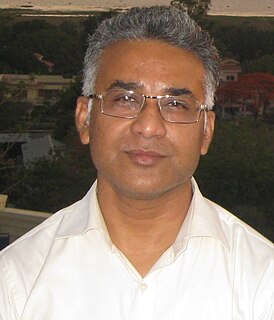Related Research Articles

Pharmacology is a branch of medicine, biology and pharmaceutical sciences concerned with drug or medication action, where a drug may be defined as any artificial, natural, or endogenous molecule which exerts a biochemical or physiological effect on the cell, tissue, organ, or organism. More specifically, it is the study of the interactions that occur between a living organism and chemicals that affect normal or abnormal biochemical function. If substances have medicinal properties, they are considered pharmaceuticals.

Good manufacturing practices (GMP) are the practices required in order to conform to the guidelines recommended by agencies that control the authorization and licensing of the manufacture and sale of food and beverages, cosmetics, pharmaceutical products, dietary supplements, and medical devices. These guidelines provide minimum requirements that a manufacturer must meet to assure that their products are consistently high in quality, from batch to batch, for their intended use. The rules that govern each industry may differ significantly; however, the main purpose of GMP is always to prevent harm from occurring to the end user. Additional tenets include ensuring the end product is free from contamination, that it is consistent in its manufacture, that its manufacture has been well documented, that personnel are well trained, and that the product has been checked for quality more than just at the end phase. GMP is typically ensured through the effective use of a quality management system (QMS).
GxP is a general abbreviation for the "good practice" quality guidelines and regulations. The "x" stands for the various fields, including the pharmaceutical and food industries, for example good agricultural practice, or GAP.
Pharmacovigilance, also known as drug safety, is the pharmaceutical science relating to the collection, detection, assessment, monitoring, and prevention of adverse effects with pharmaceutical products. The etymological roots for the word "pharmacovigilance" are: pharmakon and vigilare. As such, pharmacovigilance heavily focuses on adverse drug reactions (ADR), which are defined as any response to a drug which is noxious and unintended, including lack of efficacy. Medication errors such as overdose, and misuse and abuse of a drug as well as drug exposure during pregnancy and breastfeeding, are also of interest, even without an adverse event, because they may result in an adverse drug reaction.
The mission of the Council for International Organizations of Medical Sciences (CIOMS) is to advance public health through guidance on health research including ethics, medical product development and safety. CIOMS is an international nongovernmental organization established jointly by World Health Organization (WHO) and United Nations Educational, Scientific and Cultural Organization (UNESCO) in 1949. CIOMS represents a substantial proportion of the biomedical scientific community through its member organizations.
The International Union of Basic and Clinical Pharmacology (IUPHAR) is a voluntary, non-profit association representing the interests of scientists in pharmacology-related fields to facilitate Better Medicines through Global Education and Research around the world.

Uppsala Monitoring Centre (UMC), located in Uppsala, Sweden, is the field name for the World Health Organization Collaborating Centre for International Drug Monitoring. UMC works by collecting, assessing and communicating information from member countries' national pharmacovigilance centres in regard to the benefits, harm, effectiveness and risks of drugs.

The Innovative Medicines Initiative (IMI) is a European initiative to improve the competitive situation of the European Union in the field of pharmaceutical research. The IMI is a joint initiative of the DG Research of the European Commission, representing the European Communities, and the European Federation of Pharmaceutical Industries and Associations (EFPIA). IMI is laid out as a Joint Technology Initiative within the Seventh Framework Programme. Michel Goldman was the first executive director, from September 2009 until December 2014.
Åsmund Ragnar Reikvam is a Norwegian professor in medicine and former politician.
Pharmacoepidemiology is the study of the uses and effects of drugs in well-defined populations.
The following outline is provided as an overview of and topical guide to clinical research:

Syed Ziaur Rahman is a permanent member of 'Board of Trustees' and Chair of the Advisory Council, International Association of Medical Colleges (IAOMC). He also serves as elected secretary of IAOMC and Society of Pharmacovigilance, India (SoPI).
Pharmaceutical medicine is a medical discipline concerned with the discovery, evaluation, registration, monitoring and clinical aspects of pharmaceutical development. All medical specialties overlap to some extent, and likewise the boundaries of pharmaceutical medicine are elastic. But, at its centre is the clinical testing of medicines, translation of pharmaceutical drug research into new medicines, safety and well-being of patients and research participants in clinical trials, and understanding the safety profile of medicines and their benefit-risk balance. Pharmaceutical physicians work in the pharmaceutical industry, universities / medical schools, drug regulatory authorities and contract research organisations, but have a close affinity with their medical colleagues elsewhere.
Kenneth J. Rothman is an American epidemiologist. He is a professor of epidemiology at the Boston University School of Public Health, as well as a Distinguished Fellow at RTI International, where he is Vice President for Epidemiologic Research at RTI Health Solutions.
The Society for Epidemiologic Research is a learned society dedicated to epidemiology. It was originally proposed in 1967 by Abraham Lilienfeld, Milton Terris, and Brian MacMahon, and was founded the following year. Their motivation in founding SER was to provide an annual meeting where junior faculty in epidemiology departments and graduate students could present their ongoing research to senior epidemiologists and receive criticism, comments, and encouragement. An additional goal was to promote the exchange of ideas between epidemiologists and statisticians.
Drug Safety is a peer-reviewed medical journal covering pharmacoepidemiology and pharmacovigilance. It was established in 1986 as Medical Toxicology, and was renamed Medical Toxicology and Adverse Drug Experience in 1987. It obtained its current name in 1990. It is published by Springer Nature under the Adis Reprint, and is the official journal of the International Society of Pharmacovigilance. The editor-in-chief is Nitin Joshi. According to the Journal Citation Reports, the journal has a 2020 impact factor of 5.606.

Brian L. Strom - is inaugural Chancellor of Rutgers Biomedical and Health Sciences and the Executive Vice President for Health Affairs at Rutgers University. Strom was the Executive Vice Dean for Institutional Affairs, Founding Chair of the Department of Biostatistics and Epidemiology, Founding Director of the Center for Clinical Epidemiology and Biostatistics, and Founding Director of the Graduate Program in Epidemiology and Biostatistics, at the Perelman School of Medicine of the University of Pennsylvania. In addition to writing more than 650 papers and 15 books, he has been principal investigator for more than 275 grants. He was honored as one of the Best Doctors in America, for each of his last eight years at Penn.
Joerg Hasford is a German physician, biometrician, and epidemiologist. He is emeritus professor in the Institute for Medical Informatics, Biometry and Epidemiology at Ludwig Maximilian University of Munich, chair of the Ethics Committee of the Physicians’ Chamber of the Free State of Bavaria, president of the Association of the Research Ethics Committees in Germany and a member of the Expert Group on Clinical Trials of the European Commission. He has been influential in the study of safety of drugs and pharmacoepidemiology. He was one of the first biostatisticians to look at reliably compiled drug dosing history data in light of pharmacometric consequences. He is the namesake of the Hasford Score, a prognostic score for chronic myeloid leukemia.
The International Society of Exposure Science (ISES), is a non-profit organization established in 1990 by a group of scientists and engineers, including Paul Lioy. The formation of this society was at least partially in response to a National Research Committee (NRC) on Exposure Assessment that held a series of meetings and workshops beginning in 1987 that formed the foundation of exposure science and defined basic principles. The expertise of members in ISES is interdisciplinary and draws upon a broad array of disciplines, including: exposure assessment; biochemistry; risk assessment; bioinformatics; physiology; toxicology; epidemiology; ecology; environmental chemistry; and environmental engineering. The Society’s membership is professionally diverse and includes academic, governmental, and private sector scientists, as well as policy makers who have a common interest in exposure science. ISES has operated with a President, President-elect, Treasurer, and Secretary as well as Councilors. Councilors are elected from the membership and are allocated from the various professional categories that represent Society membership. The first set of Bylaws was approved by the membership in 1991.
Sonia Hernández-Díaz is a Spanish-born American epidemiologist who is Professor of Epidemiology in the Harvard T.H. Chan School of Public Health. Her research focuses on the evaluation of drug safety, especially during pregnancy. She has served as president of the International Society for Pharmacoepidemiology and the Society for Pediatric and Perinatal Epidemiologic Research, and is the chair of the Food and Drug Administration's Drug Safety and Risk Management Advisory Committee. During the COVID-19 pandemic, she began researching the effects of COVID-19 on pregnant women and their fetuses.